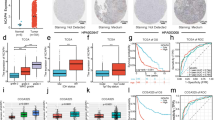Abstract
This study was to investigate whether the expressions of DNA repair genes ERCC1 (excision repair cross complementing 1), RRM1 (ribonucleotide reductase subunit M1) and BRCA1 (breast cancer 1) affected clinical outcome in patients with NSCLC. Patients with stage IIIb/IV NSCLC were given platinum-based chemotherapy. Messenger RNA expression levels of ERCC1, BRCA1 and RRM1 were determined by real-time polymerase chain reaction with TaqMan probes in the tumor. The relationship between these three genes with chemoresponse and overall survival was analyzed in this study. Eighty-five patients (median age 59, range 30–78) were enrolled into the study. Median overall survival (OS) was 13 months (range 10.8–15.2). Time to progression (TTP) was 6.1 months (range 5.5–6.7). Patients with low ERCC1 expression benefited more from a platinum-containing regimen (P = 0.094). Patients with low RRM1 expression benefited more from a gemcitabine-containing regimen. Patients with high BRCA1 expression benefited more from an anti-tubulin-containing regimen (P = 0.046). Partial response rate was 42.4%. A statistically significant difference in OS was seen in patients with low ERCC1 levels compared to patients with high ERCC1 ones. (16.5 vs. 10.0 months, P = 0.045). A significant relationship was observed between the expression of ERCC1 and BRCA1 and TTP (6.5 vs. 5.1 months, P = 0.001, 5.2 vs. 6.5, P = 0.019, respectively). High expression of BRCA1 was associated with better survival in the anti-tubulin-containing regimen subgroup (8.7 vs. 13.0, P = 0.035). ERCC1, RRM1 and BRCA1 are promising predictive and prognostic biomarkers in advanced non-small cell lung cancer.




Similar content being viewed by others
References
Camps C, Sirera R, Iranzo V. Gene expression and polymorphisms of DNA repair enzymes: cancer susceptibility and response to chemotherapy. Clin Lung Cancer. 2007;8(6):369–75.
Matakidou A, el Galta R, Webb EL, et al. Genetic variation in the DNA repair genes is predictive of outcome in lung cancer. Hum Mol Genet. 2007;16:2333–40.
Zhou W, Gurubhagavatula S, Liu G. Excision repair cross-complementation group 1 polymorphism predicts overall survival in advanced non-small cell lung cancer patients treated with platinum-based chemotherapy. Clin Cancer Res. 2004;10(15):4939–43.
Lee HW, Choia Y-W, Han JH, et al. Expression of excision repair cross-complementation group 1 protein predicts poor outcome in advanced non-small cell lung cancer patients treated with platinum-based doublet chemotherapy. Lung Cancer. 2008;59:95–104.
Ota S, Ishii G, Goto K, et al. Immunohistochemical expression of BCRP and ERCC1 in biopsy specimen predicts survival in advanced non-small-cell lung cancer treated with cisplatin-based chemotherapy. Lung Cancer. 2009;64:98–104.
Kim YH, Ishii G, Goto K, et al. Expression of breast cancer resistance protein is associated with a poor clinical outcome in patients with small-cell lung cancer. Lung Cancer. 2008;65:105–11.
Boukovinas I, Papadaki C, Mendez P, et al. Tumor BRCA1, RRM1 and RRM2 mRNA expression levels and clinical response to first-line gemcitabine plus docetaxel in non-small-cell lung cancer patients. PLoS ONE. 2008;3:e3695.
Zheng Z, Chen T, Li X, et al. DNA synthesis and repair genes RRM1 and ERCC1 in lung cancer. N Engl J Med. 2007;22:800–8.
Bunn PA Jr, Kelly K. New chemotherapeutic agents prolong survival and improve quality of life in non-small cell lung cancer: a review of the literature and future directions. Clin Cancer Res. 1998;5:1087–100.
Rudd RM, Gower NH, James LE, Gregory W, Eisen T, Lee SM, Harper PG, Spiro SG. Phase III randomized comparison of gemcitabine and carboplatin (GC) with mitomycin, ifosfamide and cisplatin (MIP) in advanced non-small cell lung cancer (NSCLC). Proc Am Soc Clin Oncol. 2002;21:292a.
Scagliotti GV, De Marinis F, Rinaldi M, Crino L, Gridelli C, Ricci S, Matano E, Boni C, Marangalo M, Failla G, et al. Phase III randomized trial comparing three platinum-based doublets in advanced non-small cell lung cancer. J Clin Oncol. 2002;20:4285–91.
Rosell R, Manegold C, Moran T, et al. Can we customize chemotherapy? Individualizing cytotoxic regimens in advanced non-small-cell lung cancer. Clin Lung Cancer. 2008;9(Supplement 2):S76–82.
Olaussen KA, Dunant A, Fouret P, et al. DNA repair by ERCC1 in non-small-cell lung cancer and cisplatin-based adjuvant chemotherapy. N Engl J Med. 2006;355:983–91.
Lafarge S, Sylvain V, Ferrara M, Bignon YJ. Inhibition of BRCA1 leads to increased chemoresistance to microtubule-interfering agents, an effect that involves the JNK pathway. Oncogene. 2001;20:6597–606.
Azuma K, Sasada T, Kawahara A, et al. Expression of ERCC1 and class III beta-tubulin in non-small cell lung cancer patients treated with carboplatin and paclitaxel. Lung Cancer. 2008; Epub ahead of print.
Reguart N, Cardona AF, Carrasco E, et al. BRCA1: a new genomic marker for non-small-cell lung cancer. Clin Lung Cancer. 2008;9:331–9.
Bepler G, Sharma S, Cantor A, et al. RRM1 and PTEN as prognostic parameters for overall and disease-free survival in patients with non-small-cell lung cancer. J Clin Oncol. 2004;15:1878–85.
de las Peñas R, Sanchez-Ronco M, Alber V, et al. Polymorphisms in DNA repair genes modulate survival in cisplatin/gemcitabine-treated non-small-cell lung cancer patients. Ann Oncol. 2008;17:668–75.
Acknowledgments
This research was supported by Shanghai Science and Technology Foundation (Grant No. 06DZ19502).
Conflict of interest statement
There is no conflict of interest with regard to this manuscript.
Author information
Authors and Affiliations
Corresponding author
Additional information
Chunxia Su, Songwen Zhou and Caicun Zhou contributed equally to this work.
Rights and permissions
About this article
Cite this article
Su, C., Zhou, S., Zhang, L. et al. ERCC1, RRM1 and BRCA1 mRNA expression levels and clinical outcome of advanced non-small cell lung cancer. Med Oncol 28, 1411–1417 (2011). https://doi.org/10.1007/s12032-010-9553-9
Received:
Accepted:
Published:
Issue Date:
DOI: https://doi.org/10.1007/s12032-010-9553-9



